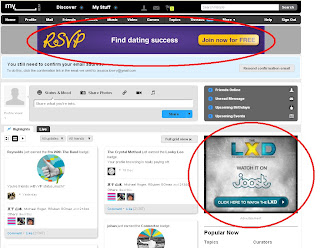One of the interesting topics that came up this week revolves around user generated content and how to incorporate advertising into the experience. This is a hot topic for a lot of businesses looking for new ways to create ads- especially contextual ones.
The main difference of contextual ads and regular ones is that the user has a relationship with the platform as a content contributor. Many businesses (I think) forget that although the service is free they are also being repaid with free content by a non-paid contributor. Consideration must be paid to this delicate relationship.
Here’s a sample of a few current online business models:
The first one is from Gmail, the free web service has been criticised for scanning through the content of your email messages for keywords in order to serve up contextual ads. I’m not bothered as a user, but I do wonder how many people actually click on the links provided.
The next example is Twitter, although I haven’t personally noticed them as a user I have read about the launch of “promoted tweets”. It’s an interesting concept, but I’m not entirely sold on the application of ads into the tweet stream. I’d rather see a banner (as much as I detest banners) or something that is outside of the tweet stream I can ignore (no, I’m not missing the point I just don’t think they need to be quite so disruptive).
MySpace (bless their white cotton socks) still have no idea how to manage this issue and put gigantic animated banners front and off-centre of user profiles. And banners follow the user right into their profile dashboard. There are 2 banners – animated, obnoxious and completely non-contextual since the paid placement is only about impressions and has little to do with clicks. A better system is one that provides a user the ability to rate an ad or stop it from being seen.
MySpace has a similar model to Facebook and LinkedIn in that they allow anyone to advertise via a self service tool. They claim (as do others) that they offer precise targeting, but we’ve seen that rarely are these ads able to reach their target audience. Unless you’re prepared to spend a lot of money to ensure you serve up enough impressions 24/7 for a minimum of 3 weeks. Essentially, in order to win at this game as an advertiser you need to outbid every other advertiser to ensure your ads are seen.
This is an unideal experience because most users’ instinct is to block it out, and in doing so the experience instantly becomes annoying. The issue is also that users don’t tend to include enough information within their profile for niche advertising to work. Knowing that a user likes music is not going to help a struggling band sell tickets- but sadly the ads aren’t even about music on MySpace. As you can see on this particular day they’re for a dating service and a dance show.
While Facebook doesn’t have perfect systems for contextual advertising I think they’re better then MySpace or Twitter because they don’t embed the ads into the user’s account dashboard and you have the ability to remove the ad if you don’t like it (although another one will instantly take its place).
LinkedIn doesn’t have the same ability for users to interact with the ads served to them, but at least the ads don’t interrupt the user experience and only exist in one specific area.
The main lesson, I think, is to allow the user to interact with ads so that they can get better and more accurate in terms of context. People are not statitics in this regard and the relationship should be personal. Also, try not to disrupt the user experience by being too flashy - less is more.
In terms of the user experience, contextual means that it makes sense and doesn't infringe on the users ability to do what they came to the site to do. I'm not visiting a friend's profile to see what ads are there- it doesn't make sense in my opinion to monetize profiles, but it does make sense to insert ads into a browsing page or a page where the user is searching for something specific. Providing ads as recommendations based on the context is a good basis for getting the job done.





